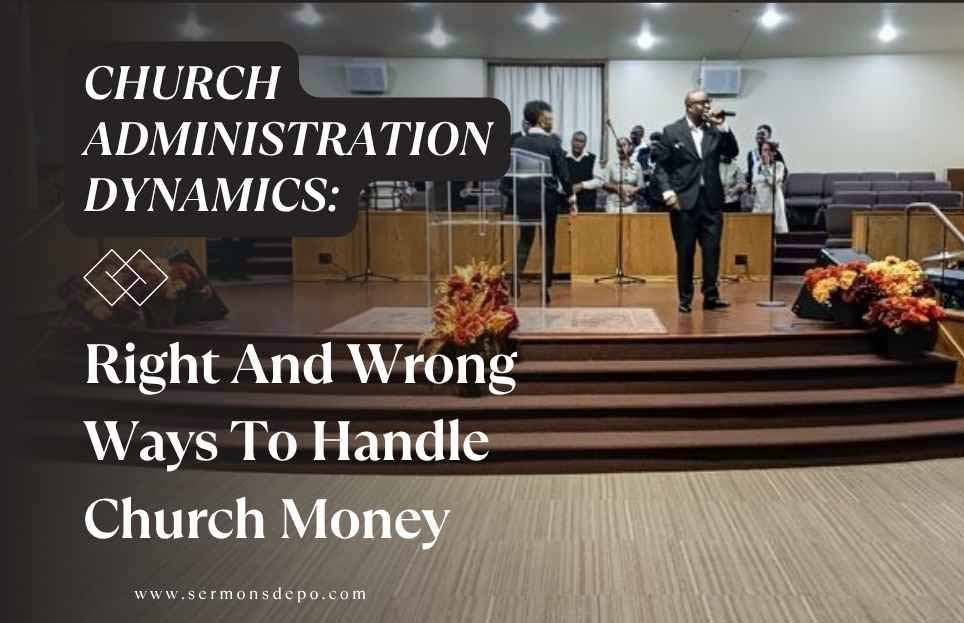I boldly declare: there is no such thing as a poor church—only churches where financial resources are mismanaged, leading to withheld blessings. Many church leaders today lack a clear, God-honoring system for handling money. This mishandling has become a wildfire that has consumed ministries and stained their witness. I once read a report listing the 20 fastest-growing churches in a country—shockingly, 16 of them were entangled in court cases due to financial scandals!

Beloved, it’s time we address the right and wrong ways of administering church finances, based not on human opinion, but on the unchanging Word of God.
A. BIBLICAL PRINCIPLES FOR HANDLING CHURCH MONEY
Scripture References: 2 Chronicles 24:4–6; 2 Kings 22:3–9; 1 Corinthians 16:1–3
From Moses’ time to the New Testament Church, the Bible provides us with a divine blueprint for managing the finances of God’s house:
- In the Old Testament, godly leaders appointed trustworthy committees who gave regular reports to the king or prophet.
- In the New Testament, collections were made for the saints, and reports were presented to the apostles.
- In all cases, no one used the church money without proper approval and accountability.
NOTE: In most nations, the church is legally recognized as a public trust—a non-governmental, non-profit organization. Therefore:
- Church property and finances belong to the Body of Christ, not any individual or family.
- It is legally and ethically required to maintain financial records and submit annual reports, preferably verified by external auditors.
B. BIBLICAL PURPOSES FOR SPENDING CHURCH MONEY
Scripture References: see below
From Genesis to Revelation, the Word of God clearly outlines what church money should be spent on. Here are the biblical priorities:
- Worship and Sanctuary Needs: (Exodus 35:1–28) – Construction and furnishing of the tabernacle.
- Maintenance of God’s House: (2 Chronicles 24:4–7) – Repairs and upgrades to the church building.
- Worship Resources: (John 12:6; 13:3–4) – Items used in services.
- Helping the Needy: (John 13:29; Acts 6:1) – Supporting widows, orphans, and the poor.
- Caring for the Church Family: (Acts 2:44–45; Acts 4:32–35) – Providing for members in need.
- Relief for the Suffering: (Acts 11:29–31) – Supporting believers during famine or persecution.
- Missions and Evangelism: (Acts 13:1–2; Acts 15:2) – Sending missionaries and supporting church planting.
- Ministerial Support: (Romans 15:24; 1 Corinthians 9:14; Philippians 4:10–19) – Supporting pastors and gospel ministers in their travel and daily needs.
- Ongoing Church Operations: (1 Corinthians 7:10–12; 11:10–12) – Funding church activities and ministries.
Let’s get back to what matters to the Kingdom!
C. WRONG WAYS CHURCH MONEY IS BEING HANDLED TODAY
Here are some ungodly practices seen in modern church financial management:
- Failure to keep accurate income and expenditure records.
- Keeping church money in personal homes or hands.
- Spending without counsel or accountability.
- Committees overpowering the pastor’s spiritual oversight.
- Lending church funds among leaders.
- Distributing money among founding members as “entitlements.”
- The pastor being the sole signatory to church accounts.
- Neglecting ministers’ welfare.
- Misusing funds for purposes not originally intended.
- Lavish spending and unwise investments.
- Remitting nearly all funds to headquarters, leaving little locally.
- Investing in secular businesses not aligned with kingdom purposes.
Sadly, in many churches today, most money is spent on buildings, vehicles, travel, and personal gain, while little is invested in missions, training, helping the needy, and outreach. This is unlike the early church, which was mission-driven and people-focused. Is it any surprise governments now question the church’s financial integrity? (Matthew 6:19–21)
D. RIGHT AND HONEST WAYS TO HANDLE CHURCH MONEY
Apostle Peter once said, “Silver and gold have I none…” (Acts 3:6). But today’s church cannot say the same. There is no shortage of money coming in—but poor stewardship is scattering it!
Here’s how to handle finances in a righteous and transparent way:
- Keep accurate, well-maintained financial records.
- Separate church finances from personal or pastoral funds.
- Pastors should be on a set salary, not dipping into the general fund.
- Appoint faithful, accountable brethren to handle money matters.
- A financial committee must report directly to the pastor.
- No one should spend church money without leadership approval.
- All spending should follow a clear, approved budget.
- Monitor all transactions and verify figures regularly.
- Local churches should retain 80–90% of their income.
- Remit only reasonable levies to headquarters after 2 years of growth.
- Have church accounts with credible banks and multiple signatories (pastor included).
- Avoid excessive financial demands from headquarters that starve local ministry.
- Annual audits must be conducted by independent professionals.
- Identify and block all loopholes; ensure debts are paid.
- The church is not a microfinance bank—discourage loans to members.
- Use funds strictly for declared purposes, with visible results.
- Focus spending on biblical priorities: missions, outreach, training, staff welfare, and supporting the needy.
- Mismanagement must not be tolerated—discipline must follow misappropriation.
Money says…
“I have no relations, I go wherever I’m sent.”
“If you don’t tie me down, I will vanish.”
“With me, you enjoy; without me, you endure.”
“If you mishandle me, I will mishandle you.”
